|
|
|
Sort Order |
|
|
|
Items / Page
|
|
|
|
|
|
|
| Srl | Item |
| 1 |
ID:
126677
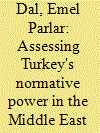

|
|
|
|
|
| Publication |
2013.
|
| Summary/Abstract |
In this study, the extent to which Turkey has been pursuing a normative foreign policy (NFP) toward the Arab revolts will be analyzed on the basis of Nathalie Tocci's description of a NFP actor, built on the following three conceptual tools: normative goals, normative means and normative results or impact. With a special emphasis on the conditioning factors that impacted Turkey's pursuit of an NFP, this paper also investigates the limitations and effectiveness of Turkey as an NFP actor in Middle East and North Africa (MENA) in order to understand if Turkey's role in the changing MENA region has gone beyond rhetoric to become empirically justified. It concludes that despite increasing normative representations and rhetoric in its foreign policy, Turkey does not currently possess a cohesive and ambitious NFP agenda and, thus, is still far from being a normative power.
|
|
|
|
|
|
|
|
|
|
|
|
|
|
|
|
| 2 |
ID:
126675
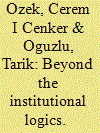

|
|
|
|
|
| Publication |
2013.
|
| Summary/Abstract |
This article aims to explain the slowing down of European Union (EU)-Turkish relations since the start of the accession negotiations in 2005 with international level systemic analysis. For this purpose, it examines the current challenges the new rising powers pose to the US-led unipolar international order and it shows how both the EU's and Turkey's responses to these challenges influence their relative powers as well as the negotiation process. By focusing on international level systemic dynamics, the article differs from the institutional explanations that explain EU-Turkish relations either with the utility-based logic of consequentialism or the norms-based logic of appropriateness.
|
|
|
|
|
|
|
|
|
|
|
|
|
|
|
|
| 3 |
ID:
126671
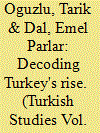

|
|
|
|
|
| Publication |
2013.
|
| Summary/Abstract |
Acknowledging Turkey as a rising power, and having commonalities in both objectives and outcomes with the other rising Southern powers, this study is a modest attempt to decode Turkey's rise with/within the West discursively and empirically and at multiple levels: systemic, regional and agent-based domestic. It aims to contribute to the debate over rising powers by developing new conceptualizations and challenging or reinterpreting the existing theoretical approaches in order to define Turkey's current power status vis-á-vis both other rising powers and the major Western powers. Turkey's recent rise, which has also been characterized by the country's high economic growth, must be nuanced from that of the Global South countries in some principal aspects. Unlike other rising powers, the Western factor weights more heavily in Turkey's recent rise. This issue's novel contribution to the existing literature on Turkish foreign policy is its attempt to understand Turkey's current rise, as well as its limitations in the context of its decades-long institutionalized and strategic relations with the West.
|
|
|
|
|
|
|
|
|
|
|
|
|
|
|
|
| 4 |
ID:
126682
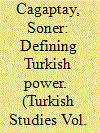

|
|
|
|
|
| Publication |
2013.
|
| Summary/Abstract |
This paper argues that Turkey only partly fits the mold that describes the rising BRICS countries, and so it is useful to designate Turkey as a special case in the rising powers literature. On the one hand, Turkey has gained from the post-Cold War international structure by expanding its outreach to a broader international audience. However, contrary to many common characterizations of other rising powers such as the BRICS, this new position has not recast Turkey as a revisionist actor bent on distancing itself from the West and challenging the Western order, or standalone actor in regional politics. Indeed, it would be incorrect to conflate Turkey's increasing international prominence with growing strategic independence from the West. In fact, Turkey's economic and political ascent remains deeply contingent upon preserving its bonds with the Western world.
|
|
|
|
|
|
|
|
|
|
|
|
|
|
|
|
| 5 |
ID:
126681
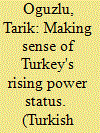

|
|
|
|
|
| Publication |
2013.
|
| Summary/Abstract |
This paper argues that Turkey only partly fits the mold that describes the rising BRICS countries, and so it is useful to designate Turkey as a special case in the rising powers literature. On the one hand, Turkey has gained from the post-Cold War international structure by expanding its outreach to a broader international audience. However, contrary to many common characterizations of other rising powers such as the BRICS, this new position has not recast Turkey as a revisionist actor bent on distancing itself from the West and challenging the Western order, or standalone actor in regional politics. Indeed, it would be incorrect to conflate Turkey's increasing international prominence with growing strategic independence from the West. In fact, Turkey's economic and political ascent remains deeply contingent upon preserving its bonds with the Western world.
|
|
|
|
|
|
|
|
|
|
|
|
|
|
|
|
| 6 |
ID:
126673


|
|
|
|
|
| Publication |
2013.
|
| Summary/Abstract |
By problematizing the relationship between geopolitics and foreign policy, this paper investigates the discursive assumptions of two different geopolitical visions of Turkish foreign policy. It seeks to explain how different political actors spatialize Turkey's geography and represent it as having a "different," "exceptional," and "unique" geopolitical position in the international system in order to justify foreign policy. By investigating how geopolitical representations produced in each of the different geopolitical vision serve to enable, restrict, and rationalize a different set of role choices for Turkey in the international system, the article is aiming to provide a critical geopolitical perspective in order to understand the discursive transformation of the geopolitical vision in the Justice and Development Party (Adalet ve Kalkinma Partisi) period.
|
|
|
|
|
|
|
|
|
|
|
|
|
|
|
|
| 7 |
ID:
126672


|
|
|
|
|
| Publication |
2013.
|
| Summary/Abstract |
Turkey's foreign policy activism in recent decades, characterized by an ambitious regional agenda and visibility in global affairs, has generated a lively debate. This paper attempts to position Turkey in modern-day international relations, in order to develop an analytical framework capable of theorizing its regional and global-level activism coherently. It thus proposes to conceptualize Turkey as a regional power and argues that such actors' behavior can be analyzed with reference to three interrelated variables: the nature of regional order, their behavioral attitudes, and the interactions at the regional-global nexus.
|
|
|
|
|
|
|
|
|
|
|
|
|
|
|
|
| 8 |
ID:
126679


|
|
|
|
|
| Publication |
2013.
|
| Summary/Abstract |
There is growing Turkish interest in the BRICS, and an ever-growing positive public perception of them. Criticism is rare, as the BRICS are interpreted as an important alternative direction in pursuit of global prestige and a new role for Turkey. Although, there is yet to be a well-defined official strategy, Ankara is interested in increasing its relationship with the BRICS. This paper aims to analyze three intertwined questions that intrude upon the putative relationship: What does "the BRICS" mean? A study of Turkey's position vis-à-vis the BRICS requires an analysis of the latter in terms of their nature, evolution and vision. What are the similarities and differences between Turkey and the BRICS? Is Turkey already a BRICS country? Or, is Turkey only eligible for BRICS membership? What are the pros and cons of a possible Turkish membership of the BRICS consortium?
|
|
|
|
|
|
|
|
|
|
|
|
|
|
|
|
| 9 |
ID:
126678
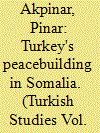

|
|
|
|
|
| Publication |
2013.
|
| Summary/Abstract |
This study discusses the limits of Turkey's discourse and practice on humanitarian diplomacy with respect to its peacebuilding in Somalia. The Turkish model of humanitarian diplomacy attempts to find a balance between conscience and interest. It is multi-track in that it pursues diplomacy through official, civic and business channels. Although there is a humanitarian dimension to Turkey's policy in Somalia, there is also a dimension of interest and power, indicating a long-term projection of securing a role for itself in regional and international politics. As tools of humanitarian diplomacy, mediation and peacebuilding provide Turkey with regional and global prestige, status and leverage ensuring safe entry into volatile and dangerous post-conflict zones such as Somalia. Humanitarian diplomacy is an ideal that adds a human dimension to diplomacy. Its realization is limited by the realities on the ground, the interests of the intervening country, the public support for humanitarian diplomacy, the capacity of the intervening country as well as by the need for regional recognition and international support.
|
|
|
|
|
|
|
|
|
|
|
|
|
|
|
|
|
|
|
|
|